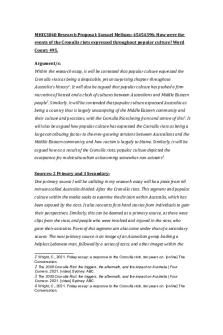Research Proposal - HIST 495 PDF

| Title | Research Proposal - HIST 495 |
|---|---|
| Course | Senior Thesis in History |
| Institution | University of Maryland Global Campus |
| Pages | 2 |
| File Size | 63.2 KB |
| File Type | |
| Total Downloads | 116 |
| Total Views | 140 |
Summary
HIST 495...
Description
Jeffrey D. Glasco Department of History Linfield College (503)-883-2306 email: [email protected]
Paper Proposal for 2007 Pacific Coast Conference on British Studies
Paper Title: “‘Endeavoring to Find Ourselves Men’: Enlightened Revolutionaries and the Nore Mutiny of 1797.” Abstract: My proposed paper examines the enlightened revolutionaries amongst the seamen of the British Royal Navy of the 1790s. My research shows that a large number of British seamen came to embrace the enlightened ideals of political equality that had been put into practice by the revolutionaries in France. Contrary to the traditional historiography, the leaders of these men were not landsmen brought in through the quota system, but rather generally experienced seamen who had gained a rough version of enlightened thought from the radicals present in British society. Inextricable from these new political ideas was a different vision of manhood which rejected the political subordination implicit in the plebeians’ acceptance of the social contract. Like the French revolutionaries, they denounced both monarchy and privilege in general; instead pursuing a new political course that proposed a new manhood, one based on the political equality of all men. However, the evidence suggests that the radical seamen and marines did not envision a society of pure equality for all men. Instead they sought to collapse the various classbased masculine hierarchies into a single hierarchy in which all men would compete. They envisioned a society in which all men would have a voice in politics; hence, they rejected the existing patrician-plebeian social compact of the Old Regime of Britain.
These radicalized men sprang into action during the large-scale British naval mutinies of 1797. While the majority of the seamen sought only a redress of material grievances and a reworking of the patrician-plebeian social contract, the revolutionary element of the seamen attempted to divert mutinous action into a national revolution. Despite initial success among the mutineers, the radicals were defeated by their traditionalist peer seamen who executed a successful counter-which ended the short-term prospect of a revolution in Britain. Despite the failure of these revolutionaries amongst the ranks of the British seamen, their motives and actions demonstrate that, contrary to more nationalist versions of British history, an enlightened working-class revolution did take place in Britain in the 1790s....
Similar Free PDFs

Research Proposal - HIST 495
- 2 Pages

Research Proposal
- 3 Pages

Research Proposal
- 5 Pages

Research proposal
- 12 Pages

Research Proposal
- 15 Pages

Research proposal template APA
- 8 Pages

Research Proposal PO370 X
- 4 Pages

Atu Research Proposal - reserach
- 37 Pages

Research proposal complete
- 50 Pages

The Research Proposal
- 2 Pages

Research Proposal A2
- 10 Pages

Example of research proposal
- 18 Pages

Research proposal template APA
- 8 Pages

MHIX3040 Research Proposal
- 3 Pages
Popular Institutions
- Tinajero National High School - Annex
- Politeknik Caltex Riau
- Yokohama City University
- SGT University
- University of Al-Qadisiyah
- Divine Word College of Vigan
- Techniek College Rotterdam
- Universidade de Santiago
- Universiti Teknologi MARA Cawangan Johor Kampus Pasir Gudang
- Poltekkes Kemenkes Yogyakarta
- Baguio City National High School
- Colegio san marcos
- preparatoria uno
- Centro de Bachillerato Tecnológico Industrial y de Servicios No. 107
- Dalian Maritime University
- Quang Trung Secondary School
- Colegio Tecnológico en Informática
- Corporación Regional de Educación Superior
- Grupo CEDVA
- Dar Al Uloom University
- Centro de Estudios Preuniversitarios de la Universidad Nacional de Ingeniería
- 上智大学
- Aakash International School, Nuna Majara
- San Felipe Neri Catholic School
- Kang Chiao International School - New Taipei City
- Misamis Occidental National High School
- Institución Educativa Escuela Normal Juan Ladrilleros
- Kolehiyo ng Pantukan
- Batanes State College
- Instituto Continental
- Sekolah Menengah Kejuruan Kesehatan Kaltara (Tarakan)
- Colegio de La Inmaculada Concepcion - Cebu

